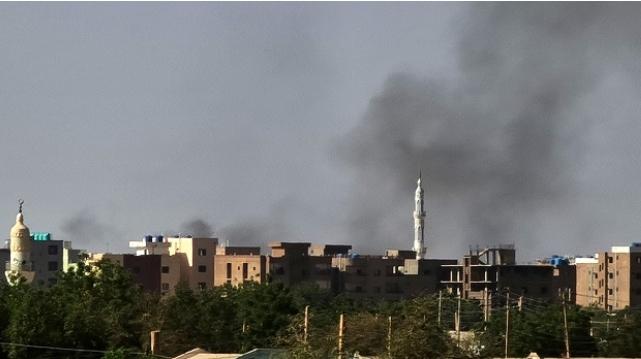Air strikes again shook Sudan’s capital Monday while the latest truce talks in Jeddah have yielded no progress, with a Saudi diplomat saying both sides consider themselves “capable of winning the battle”.
Sudan was thrown into deadly chaos when fighting broke out on April 15 between the forces of army chief Abdel Fattah al-Burhan and his deputy turned rival Mohamed Hamdan Daglo, who heads the paramilitary Rapid Support Forces (RSF).
The battles have since killed hundreds, wounded thousands and left millions barricaded inside their homes amid dire shortages of water, food and basic supplies.
The feuding generals have sent representatives to Saudi Arabia for talks on establishing a humanitarian truce in an effort also backed by the United States, but to no avail so far.
By Monday, the talks had yielded “no major progress”, a Saudi diplomat told AFP, speaking on condition of anonymity.
READ ALS: Sudan Crisis: Conflicting Sides Set For face-to-face Saudi Arabia Talks
“A permanent ceasefire isn’t on the table… Every side believes it is capable of winning the battle,” the diplomat added.
In Khartoum, a city of five million, terrified residents reported more combat, now in its fourth week, as they hid out in their homes amid power outages and sweltering heat.
A southern Khartoum resident told AFP the family could hear “the sound of airstrikes which appeared to come from near a market in central Khartoum”.
‘Dangerous everywhere’
The fighting has sparked a mass exodus of foreigners and of Sudanese, in both air and sea evacuations and arduous overland journeys to Egypt, Chad, South Sudan and other neighbouring countries.
“It’s very dangerous everywhere,” said Rawaa Hamad, who escaped from Port Sudan on an evacuation flight to Qatar on Monday carrying 71 people.
In Sudan, she said, there is “no safety now, unfortunately”, with its people enduring “a lack of everything — a lack of water, lack of fuel, lack of medicine, lack of even hospitals and doctors”.
READ ALSO: Sudan: ‘Gunshots Everywhere, We Paid To Urinate, Bath, Brush’ Returnees Recount Ordeals
The battles have killed more than 750 people and injured over 5,000, according to a count by the Armed Conflict Location and Event Data Project.
The United Nations has warned of a widening humanitarian crisis after fighting has already displaced 335,000 people and created 117,000 refugees.
More than 60,000 Sudanese have fled north into Egypt, 30,000 west to Chad, and over 27,000 to South Sudan, according to the UN.
The UN top humanitarian official, Martin Griffiths, has travelled to the Saudi coastal city of Jeddah, the site of what Washington and Riyadh have labelled “pre-negotiation talks”.
A UN official said on Monday that Griffiths had “asked to join the negotiations” between the warring sides, but that his request had not been approved so far.
Mediation efforts
Saudi Arabia is pushing for “a timetable for expanded negotiations to reach a permanent cessation of hostilities”, its foreign ministry said.
The Jeddah talks, which are set to continue “in the following days”, aim to reach “an effective short-term halt” to the fighting, facilitating aid delivery and restoring basic services, it added.
READ ALSO: Sudan: Battles Rage On As UN Warns Of ‘Catastrophe’
A major breakthrough would be to secure humanitarian corridors to allow aid through Port Sudan on the Red Sea coast to Khartoum and to the strife-torn Darfur region bordering Chad.
Since mid-April, multiple truce deals have been declared and quickly violated in the poverty-stricken country with a history of instability.
Mediation efforts have multiplied.
The African Union — which holds little leverage after suspending Sudan following a coup in 2021 — and East African regional bloc IGAD are pushing for discussions mediated by South Sudan.
The Arab League on Sunday called for an end to hostilities and the preservation of Sudan’s “sovereignty”, but without specifying details.
Heavyweights in the pan-Arab bloc are divided on Sudan, with Egypt supporting Burhan and the United Arab Emirates seen to be backing the RSF, according to experts.
AFP
